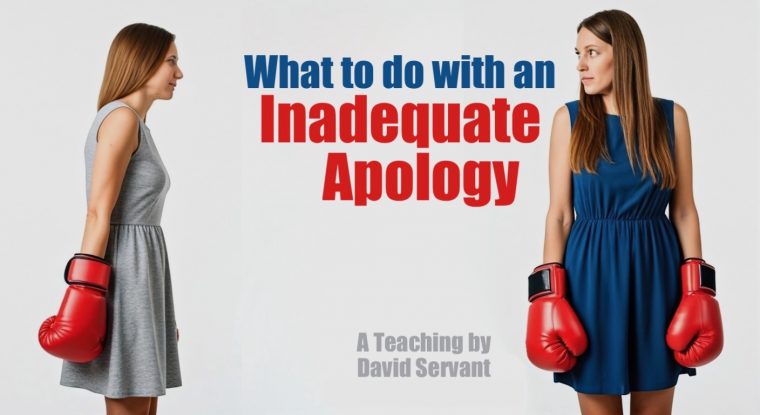
Who doesn’t desire good relationships with everyone? We all wish for that. The reality is, however, that relationships sometimes sour. When they do, nobody enjoys it. Blame is always assigned to the other person, and the fighting often grows more intense until we retreat into our respective corners of the boxing ring, waiting for an apology. Often, neither side budges, resulting in a permanent rift. And we live with a permanently broken relationship.
There are plenty of examples of broken relationships in the Bible. Foremost is the broken relationship between God and rebel sinners. God “waits for an apology” that often never comes. His patient waiting, of course, is an expression of Him loving His enemies. And while He waits, He even lovingly tries to motivate them to repent of their rebellion through both positive and negative incentives. Tragically, most remain rebels. When they die, God’s mercy ends and His judgment begins.
There are also plenty of examples of broken human relationships in the Bible. Those who are in rebellion against God are similarly opposed to those who love and serve God. In such cases, those who love God are supposed to imitate Him by “loving their enemies” and “praying for those who persecute them” (Matt. 5:44). Sometimes that undeserved mercy pricks the consciences of our persecutors and they repent. But often it does not, resulting in a permanently broken relationship.
But what about conflict between people who both love God? Examples of that can also be found in the Bible. Naturally, when it occurs, God expects more from His people. They aren’t supposed to retreat to their respective corners of the boxing ring to wait for the other person to apologize. They are supposed to work for reconciliation even when they are convinced that all the blame lies with the other party. Jesus said, “If you are presenting your offering at the altar, and there remember that your brother has something against you, leave your offering there before the altar and go; first be reconciled to your brother, and then come and present your offering” (Matt. 5:23-24, emphasis added). Jesus also said, “If your brother sins, rebuke him; and if he repents, forgive him” (Luke 17:2, emphasis added). No allowance for “the silent treatment” between brothers! We are commanded to love one another.
But following even those above-mentioned instructions doesn’t always result in reconciliation, as is made so clear in Jesus’ words about church discipline:
If your brother sins [some ancient manuscripts add “against you,” which is certainly supported by the context], go and show him his fault in private; if he listens to you, you have won your brother. But if he does not listen to you, take one or two more with you, so that by the mouth of two or three witnesses every fact may be confirmed. If he refuses to listen to them, tell it to the church; and if he refuses to listen even to the church, let him be to you as a Gentile and a tax collector (Matt. 18:15-17).
So even relationships between “brothers” can be broken permanently in cases when an offending brother refuses to apologize. In such cases, we are tempted to conclude that folks who resist the collective call of the entire church to repent reveal that they are not actually genuine brothers (and we may be right). But Jesus never indicated that in what we just read. He said to treat a “brother”—who refuses the collective call of the church to repent—as a Gentile and a tax collector.
Thankfully, most attempts at reconciliation between Christians who are at odds with each other do result in reconciliation through confrontation and apology. But there are those cases when it seems as if the offender is just “going through the motions” of an apology in order to fulfill his Christian duty and smooth things over. His apology doesn’t seem sincere, or he does not seem sorrowful enough about his offense. What should we do in those kinds of situations?
Thankfully, Jesus also gave instructions about inadequate apologies from our “brothers”:
If your brother sins, rebuke him; and if he repents, forgive him. And if he sins against you seven times a day, and returns to you seven times, saying, “I repent,” forgive him (Luke 17:3-4), emphasis added.
I would be willing to bet that, in the history of Christianity, there has never been a single case in which someone apologized seven times in one day after six times committing the same offense! If anyone ever experienced just two or three cycles of offensive followed by apology, he would be sorely tempted to doubt the sincerity of the latest apology! But Jesus certainly made His point. He wants us to always err on the side of mercy rather than judgment. We should give the apologetic offender the benefit of the doubt, and latch on to whatever we can that helps rebuild a bridge to a restored relationship. The alternative—telling the offender that you don’t believe his apology is sincere or sufficient, would only add another layer of bricks to the dividing wall. There can be such a thing as “too little, too late.”
When you think about it, no apology is actually sufficient, because no apology ever undoes the past offense. The opportunity for the ideal scenario is gone for good. A sin has occurred and it can’t be erased. But the next best thing is an apology. Granted, sincere apologies are the best kind, but even an insincere apology requires some humility, and it offers a hope for reconciliation. So grab it. Forgive. And starting building the bridge of forgetting.
And here is a wonderful caveat to all of this: Because God doesn’t hold us to a higher standard than He holds Himself, we can be sure He is just as gracious as He expects us to be. We sometimes wonder if our repentance and apologies to Him are sincere enough, and especially when we find ourselves repeating a cycle of sin and repentance. But God’s forgiveness is not based on our sincerity. It is based on His grace. And He grabs on to anything that will build a bridge to reconciliation.
I know some Pharisees will find fault with me on that last point, claiming I am giving Christians a license to sin, but no genuine Christian is looking for any license to sin. We love God. Still, “we all stumble [that indicates non-intentionality] in many ways” (Jas. 3:2). And when we apologize after we stumble, there is an ocean of grace for which our forgiveness requires just a teaspoon.
“For a righteous man falls seven times, and rises again” (Prov. 24:16).


